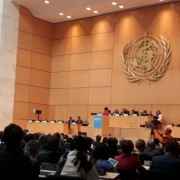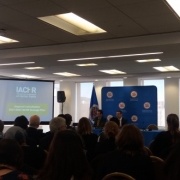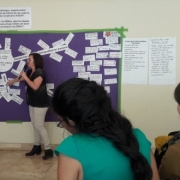We participated in the regional hearing of the IACHR in pursuit of compliance with the DESCA
We were part of one of the public hearings convened by the Inter-American Commission on Human Rights (CIDH), held on March 17, 18, 20, 21, and 22 of the current day in Washington.
“Below, we offer a google translate version of the original article in Spanish. This translation may not be accurate but serves as a general presentation of the article. For more accurate information, please switch to the Spanish version of the website. In addition, feel free to directly contact in English the person mentioned at the bottom of this article with regards to this topic.”
In the framework of public hearings, the one that calls us is about “Right to access relevant information for the enforceability of economic, social, cultural and environmental rights.” This was requested from the IACHR in conjunction with organizations in the region such as Fundación Construir (Bolivia); Institute of Legal and Social Studies of Uruguay (Ielsur, Uruguay); Regional Alliance for Free Expression and Information (Uruguay); ARTICLE 19 (Brazil); Archives Center and Access to Public Information (CAinfo, Uruguay); Fundar – Analysis and Research Center (Mexico); and Civil Association for Equality and Justice (ACIJ, Argentina).
The audience of which we were a part, exposed to the Inter-American System of Human Rights (SIDH) the need to consolidate standards regarding production and access to information that allow progress towards the effective implementation and enforceability of economic, social, cultural and environmental (DESCA). There are international and regional commitments in this area that show clear obligations regarding production and access to information, which are necessary to comply with the requirements to enforce and exercise these rights. However, in the countries of the region there are serious shortcomings in their compliance.
Several international organizations have not found the necessary information to be able to determine if DESCA are respected in the countries of the region. Specifically, they have noted deficiencies related to the collection and systematization of information on the exercise of women’s rights to education, employment, health and social security; children and adolescents; People with disabilities; indigenous Afro-descendants and migrant workers and their families. In this same line, is that they have specified that it is a state obligation to produce information from which the validation of indicators is possible and, in general, access to many of the guarantees covered by each social right.
Argentina and Cordoba are not the exception in this aspect. The case of contamination by the Bajo Grande WWTP plant, which affects the Chacras de la Merced community, is a clear example of the human rights violations aggravated by the deficiency in access to information. The State does not provide data on the levels of air and soil pollution, as well as the information collected on the effects on the health of the people of the neighborhood, mainly women and children. In this way, obstacles to the enforceability of the rights of the people affected are placed.
That is why it is fundamental to strengthen the implementation of standards around the scope of the state obligations of production, availability and timely access to information on DESCA. The latter, in addition to being essential for the design, implementation and evaluation of public policies, allows strengthening the enforceability strategies of civil society, generating the conditions for many violations of rights to be repaired.
More information
Contact
Juan Carballo – juanmcarballo@fundeps.org








